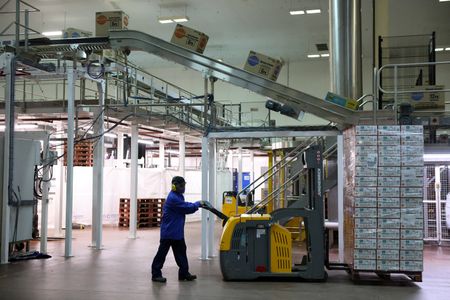By Lucy Raitano
LONDON (Reuters) – European companies are set to deliver a third straight quarter of profit growth, which may help to maintain newfound investor enthusiasm for the region despite political and economic turmoil and concerns over U.S. President Donald Trump’s tariffs threat.
European stocks are trading at record highs, having outperformed Wall Street in the opening weeks of 2025, yet valuations are still rock bottom in comparison.
Investor cash has poured into the European market at the second-fastest pace in 25 years in January, according to Bank of America, even before Trump assumed the presidency and the first European company earnings began to trickle in.
Analysts are cautious, having chopped their estimates for fourth-quarter earnings growth to 1.5% from the previous year – or 4.9% excluding energy – down from an estimated 2.5% just two weeks ago, according to data from LSEG I/B/E/S.
This would still mark the third consecutive quarter of expansion with forecasts showing both profit and sales growth for the first time since the first quarter of 2023.
“There is a high chance that if companies exceed expectations during the reporting season, share prices could rise. The potential for upside is greater than the downside,” said Matthieu Dulguerov, head of equities at REYL Intesa Sanpaolo.
However, with Trump threatening to impose tariffs on European Union imports, and political and economic uncertainty wracking the euro zone’s growth engines – France and Germany – the mood is tense.
“We think European management teams will err on the side of caution and give wide ranges considering the uncertainty and previous difficult years in Europe,” said Bernie Ahkong, CIO Global Multi-Strategy Alpha at UBS O’Connor. He cited the uncertainty around the new U.S. administration, the Chinese economy, a key market for European exporters, and geopolitics.
Luxury bellwether LVMH reports on Tuesday, Dutch computer chip equipment maker ASML on Wednesday, and Deutsche Bank the following day. Danish drugmaker Novo Nordisk reports the week after.
LOWER BAR, EASIER BEATS
It’s early days for earnings, but already, Swiss luxury giant Richemont’s shares recorded their biggest daily rise in 16 years on Jan. 16 after fourth-quarter sales smashed expectations.
The latest surveys of business activity show the euro zone’s three largest economies – Germany, France and Italy – are stuck in an industrial recession, lagging global surveys, which have been driven by a strong U.S. economy, thereby cushioning European earnings.
Another factor that has given European stocks a tailwind is the euro, which has lost some 4.5% in the last year.
“Many believe Europe is facing economic challenges and will have lower growth compared to the U.S. However, most European companies are not heavily reliant on European economic growth as they operate globally,” said Dulguerov.
Goldman Sachs strategists estimate that 60% of European company revenues come from outside Europe.
European shares are trading near their largest discount on record to the S&P 500 index, at a forward price-to-earnings ratio of around 13.3, compared with 21.6 for U.S. stocks, according to LSEG Datastream.
Many of these factors are already baked into investors’ assumptions, and for Ahkong, the commentary around full-year guidance will be key for his team taking a strong view on specific sectors.
Investors will be poring over company announcements for any clarity on the impact of Trump’s policies on results.
On Monday, Lanxess shares jumped 5.1% after the German specialty chemicals maker said it expected its fourth-quarter core profit to exceed market expectations by more than 20%, largely due to pre-buying by U.S. customers ahead of Trump’s Jan. 20 inauguration, given his threats on tariffs.
(Reporting by Lucy Raitano; Editing by Amanda Cooper and Emelia Sithole-Matarise)











